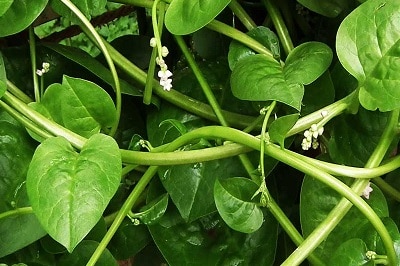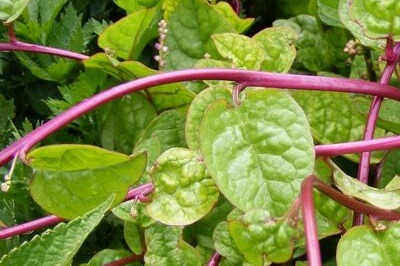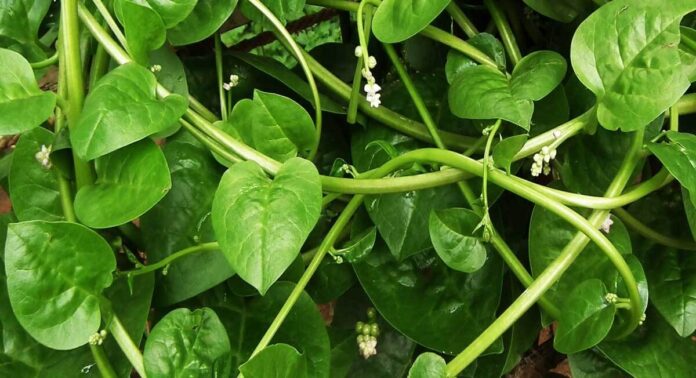Malabar spinach (Basella alba) is a popular tropical leafy-green vegetable. It is a vine and people commonly grow them as backyard herbs in their backyard gardens.
There are two important vine spinach cultivars belonging to the Basellaceae family. The Basella alba, which has a green stem and dark green leaves and Basella rubra with purple and dark green leave and pink vines. Both have similar health benefits. The Basella alba is the commonest in Ghana.


Malabar spinach (Basella alba) VS Spinach
The Malabar spinach (Basella alba) and Spinach (Spinacia oleracea) are leafy vegetables with similar nutritional content and benefits. However, both belong to different families. More so, the Malabar is suited for the tropical regions whiles the spinach is for the temperate regions. Additionally, the Malabar spinach grows as a vine and the spinach, a shrub.
Read also: Spinach: 19 Incredible Health Benefits
Health benefits of Malabar spinach
- Weight loss
Malabar spinach is very low in calories and fats (100 grams of raw leaves provide just 19 calories). Nonetheless, it holds an incredibly good amount of vitamins, minerals, and antioxidants.
- Smooth digestion
Its thick, fleshy leaves are an excellent source of non-starch polysaccharide, mucilage. In addition to natural fibre (roughage) that is found in the stem and leaves, its mucilaginous leaves facilitate smooth digestion. A fibre diet brings a reduction in cholesterol absorption and helps prevent bowel problems.
- Promotes Good eyesight
Basella leaves and stems are incredibly rich sources of vitamin A. 100 g fresh leaves provide 8000 IU or 267% of recommended daily allowance (RDA) of this vitamin. Vitamin-A is required for maintaining healthy mucus membranes and skin, and is essential for good eyesight.
- Cancer prevention
Consumption of natural vegetables and fruits rich in vitamin-A and flavonoids has been known to offer protection from lung and oral cavity cancers.
- Resistance against infections
Basella has more vitamin C content than Spinach. 100 g of fresh greens has 102 mg or 102% of the daily recommended levels of vitamin C. Vitamin C is a powerful antioxidant, which helps the human body develop resistance against infectious agents and scavenge harmful oxygen-free radicals.
- Prevents anaemia
Like in spinach, Basella too is an excellent source of iron. 100 g fresh leaves contain about 1.20 mg or 15% of the daily intake of iron. Iron is an essential trace element required by the human body for red blood cell (RBC) production. Additionally, this element acts as a co-factor for the oxidation-reduction enzyme, cytochrome oxidase, during cellular metabolism.
Read also: 22 Essential benefits of Cocoyam leaves (Kontomire)
- DNA production and growth
It also has good amounts of many B-complex vitamins such as folate, vitaminB6 (pyridoxine), and riboflavin. 100 g fresh leaves offer 140 µg or 35% of folates. This vitamin is one of the essential compounds for DNA production and growth.
- Prevents defects during pregnancy
Moreover, folate deficiency during the very early stages of pregnancy might results in the neural tube defects in the newborn baby. Anticipating and pregnant women are, therefore, advised to include a lot of fresh greens in their diet to help prevent neural tube defects in the offspring.
- Maintains blood pressure
More so, Basella leaves are good sources of minerals like potassium (11% of RDA/100 g), manganese (32% of RDA/100 g), calcium, magnesium, and copper. Potassium is an important part of cellsand body fluids that helps control heart rate and blood pressure. Manganese and copper are used by the human body as a co-factor for the antioxidant enzyme, superoxide dismutase.
- Anti-ageing Benefits
Additionally, the free radicals in your body damage your skin, thereby causing premature ageing. These free radicals are destroyed by the antioxidants in Basella. So, when you eat spinach regularly, you will keep up your skin and slow down age-related degeneration, making your skin look younger and rejuvenated.
- Relaxes the Body
Also, it has tremendous amounts of zinc and magnesium. This enables you to sleep better at night, making way for more effective healing. Magnesium helps in replenishing your lost energy within seconds. A good quality sleep rests your tired eyes, thus relaxing your body.
Compare: Nutrition Facts about Spinach
Nutrition facts
| Principle | Nutrient Value | Percentage of RDA |
|---|---|---|
| Energy | 19 Kcal | 1% |
| Carbohydrates | 3.40 g | 2.5% |
| Protein | 1.80 g | 3% |
| Total Fat | 0.30 g | 1.5% |
| Cholesterol | 0 mg | 0% |
| Vitamins | ||
| Folates | 140 µg | 35% |
| Niacin | 0.500 mg | 3% |
| Pantothenic acid | 0.053 mg | 1% |
| Pyridoxine | 0.240 mg | 18% |
| Riboflavin | 0.155 mg | 13% |
| Thiamin | 0.050 mg | 4% |
| Vitamin A | 8000 IU | 267% |
| Vitamin C | 102 mg | 170% |
| Electrolytes | ||
| Sodium | 24 mg | 1.5% |
| Potassium | 510 mg | 11% |
| Minerals | ||
| Calcium | 109 mg | 11% |
| Copper | 0.107 mg | 12% |
| Iron | 1.20 mg | 15% |
| Magnesium | 65 mg | 16% |
| Manganese | 0.735 mg | 32% |
| Selenium | 0.8 µg | 1.5% |
| Zinc | 0.43 mg | 4% |
References:
21 Amazing Benefits Of Spinach (Palak) For Skin And Health (www.stylecraze.com)
15 Impressive Spinach Benefits (www.organicfacts.net)
Basella (vine spinach) nutrition facts (www.nutrition-and-you.com)
USDA National Nutrient database


